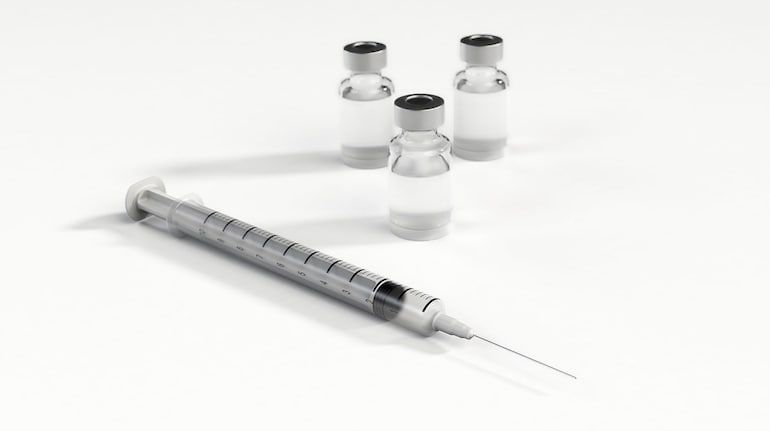
Representative image
The growing COVID-19 scare and increasing public demand for vaccines have prompted several states to reach out to the Centre but the Union government is staring at a stockout, with less than 1 crore shots of Coronavirus vaccines left in its kitty.
“Several states, such as Karnataka, Uttar Pradesh and Telangana, have made desperate calls for COVID-19 vaccines in view of the demand for booster shots but there is no decision yet on whether we are going to procure more stocks,” said a government source.
Curiously, there has been no discussion on fresh procurements by the government for the national COVID-19 vaccination programme even during the two crucial top-level meetings over the last two days.
Moneycontrol reached out to Union health secretary Rajesh Bhushan for his comments on the issue but no response has been received so far. This report will be updated when he responds to the query.
Government figures show that while over 220 crore COVID-19 vaccine doses have been administered in the country so far to people aged 12 years and above, the coverage of booster doses—allowed only for adults — stands at just 28 percent of the eligible beneficiaries.
On December 22, Prime Minister Narendra Modi had himself chaired a high-level meeting on COVID-19 status and preparedness as China is grappling with its worst-ever pandemic crisis after dumping its zero-COVID policy earlier this month.
A day earlier, there was another meeting chaired by Union health minister Mansukh Mandaviya. At both these meetings, there was no discussion on procuring more vaccines for the COVID-19 vaccination programme, top officials who attended these meetings said.
The government inaction is surprising since many senior government functionaries have, in fact, indicated that there will be a greater push for expanding the booster dose coverage.
Vaccine stock with states
Details accessed by Moneycontrol show that there is just about 77.34 lakh doses of Covaxin by Bharat Biotech left in government stock while the amount of Covishield, produced by Serum Institute of India (SII), left with states, is just about 2.89 lakh doses, as on December 22.
Also read I MC Explains | Why COVID-19 is spiking in China and whether you should be worried
The document, which was part of a presentation shown in the review meeting by the PM, also shows that all 9.85 crore doses of Corbevax, a COVID-19 vaccine by Biological E and currently permitted for the 12-14-year age group in government facilities, has been consumed.
It showed that Maharashtra had the highest amount of vaccines —nearly 17 lakh. Six states and Union Territories, which include Odisha, Sikkim, Mizoram, Dadra and Nagar Haveli, Daman and Diu, and Lakshadweep, had a complete stockout.
Most other states have less than 10 lakh vaccine doses left with them, prompting a demand for fresh supply from the Centre.
Are free vaccines provided now?
As part of the immunisation programme, the Centre is providing free vaccines to the 12-17-year age group as well as those above 60 years of age.
Those above 60 years of age are also eligible for the third dose of vaccine, called precautionary or booster dose, at government hospitals. This is available free of cost. Those in the 18-59 age group can avail it — only at private hospitals — at pre-decided rates.
‘Money not a problem’
Sources said that, so far, Rs 35,500 crore have been spent by the Centre on COVID-19 vaccines, which include Rs 26,500 paid to Serum Institute of India, Rs 7,500 crore to Bharat Biotech and Rs 1,500 crore to Biological E.
“Since it’s the Union finance ministry which pays for the vaccine largely—apart from the sum utilised from the PM Care funds—money is not a problem but it needs to be decided whether the government wants to spend more on COVID-19 vaccines or people will be encouraged to avail vaccines from the private market,” said a source.
When reached for comment, none of the companies — SII, Bharat Biotech or Biological E — shared information till the writing of this report on whether they have heard from the government on vaccine procurement over the last few days.
An SII spokesperson, however, did say that the companies can provide Covishield doses quickly, if required by the government.
Officials, meanwhile, maintained that, now, the focus may be on heterologous boosters, which means that those who have received Covishield or Covaxin earlier may be encouraged to receive Corbevax or Bharat Biotech’s nasal vaccine as the third dose.
Corbevax, as a booster dose, is currently available only in the private market and Bharat Biotech’ nasal vaccine, which claims to prevent COVID-19 infection, though approved by the Drug Controller General of India, is yet to be launched for the public.
Low demand disrupted supply chain?
While the COVID-19 booster dose is back in the spotlight again, some experts point out that as there is limited evidence on its impact of booster doses on disease transmission, this could have been the primary reason why there has been a low uptake of booster doses.
“Given the low demand, the supply chain and booster stockpiles would not have been a high priority,” said Dr Oommen John, public health researcher with New-Delhi based George Institute of Global Health.
Boosters work only if they cover the predominant virus strain at the time of active transmission, he said, adding that as it is not confirmed which SARS CoV 2 strain is causing the high transmission in China, knee-jerk boosting of the vulnerable populations might not be conferring any additional protection.
“Precautionary measures of masking and early detection of areas of new transmission would be critical,” said John. “Early genomic sequencing in hotspots will provide insights on what type of boosters might be protective,” he said.

